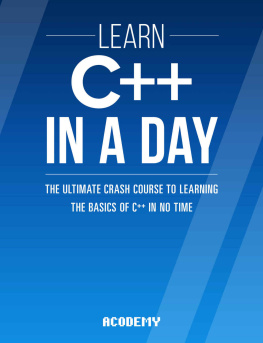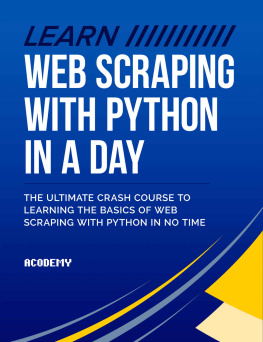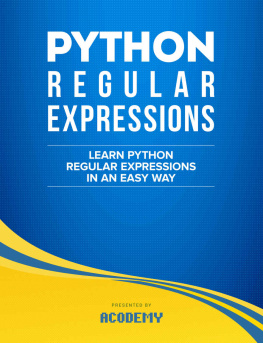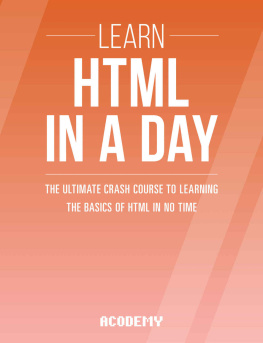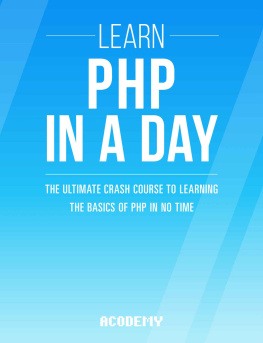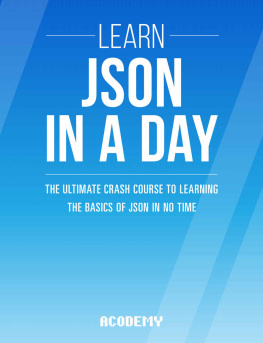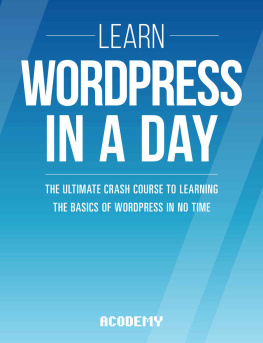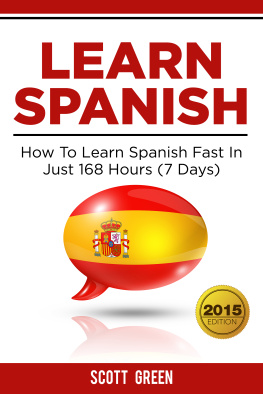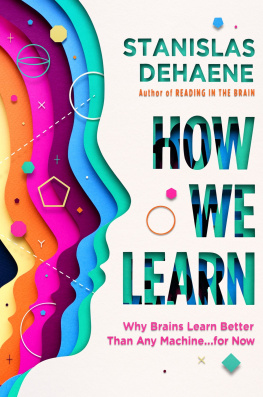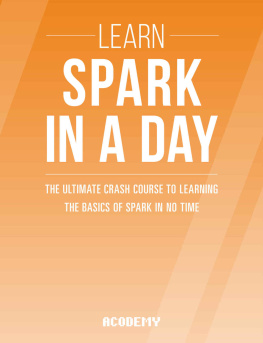Acodemy - C++: Learn C++ In A DAY!
Here you can read online Acodemy - C++: Learn C++ In A DAY! full text of the book (entire story) in english for free. Download pdf and epub, get meaning, cover and reviews about this ebook. year: 2015, genre: Home and family. Description of the work, (preface) as well as reviews are available. Best literature library LitArk.com created for fans of good reading and offers a wide selection of genres:
Romance novel
Science fiction
Adventure
Detective
Science
History
Home and family
Prose
Art
Politics
Computer
Non-fiction
Religion
Business
Children
Humor
Choose a favorite category and find really read worthwhile books. Enjoy immersion in the world of imagination, feel the emotions of the characters or learn something new for yourself, make an fascinating discovery.
- Book:C++: Learn C++ In A DAY!
- Author:
- Genre:
- Year:2015
- Rating:4 / 5
- Favourites:Add to favourites
- Your mark:
- 80
- 1
- 2
- 3
- 4
- 5
C++: Learn C++ In A DAY!: summary, description and annotation
We offer to read an annotation, description, summary or preface (depends on what the author of the book "C++: Learn C++ In A DAY!" wrote himself). If you haven't found the necessary information about the book — write in the comments, we will try to find it.
Acodemy: author's other books
Who wrote C++: Learn C++ In A DAY!? Find out the surname, the name of the author of the book and a list of all author's works by series.
C++: Learn C++ In A DAY! — read online for free the complete book (whole text) full work
Below is the text of the book, divided by pages. System saving the place of the last page read, allows you to conveniently read the book "C++: Learn C++ In A DAY!" online for free, without having to search again every time where you left off. Put a bookmark, and you can go to the page where you finished reading at any time.
Font size:
Interval:
Bookmark:
All rights reserved. No portion of this book may be reproduced mechanically, electronically, or by any other means, including photocopying without the permission of the publisher
LEARN C++ IN A DAY
The Ultimate Crash Course to Learning the Basics of C++ in No Time
Disclaimer
The information provided in this book is designed to provide helpful information on the subjects discussed. The authors books are only meant to provide the reader with the basics knowledge of a certain topic, without any warranties regarding whether the student will, or will not, be able to incorporate and apply all the information provided. Although the writer will make his best effort share his insights, learning is a difficult task and each person needs a different timeframe to fully incorporate a new topic. This book, nor any of the authors books constitute a promise that the reader will learn a certain topic within a certain timeframe.
Table of Contents
Objective: Get a brief introduction, history, and understanding of the C++ language.
C++ is widely known as a low-level, advanced language that every programmer should know. One main difference between C and C++ is object-oriented programming (OOP). The OOP side of C++ is probably makes it much more difficult to understand and learn. This ebook is meant to help new programmers with the language, including help with OOP methodologies and structures.
A Brief History of C++
The C++ language first appeared in the 1980s. It was created by a Danish computer scientist named Bjarne Stroustrup. The original name for the language was C with Classes, but was later changed to C++. The main original purpose for C++ was adding OOP to the older C language.
As the years went on, C++ evolved and was standardized. C++ was created as a low-level language, which means that it works closes to binary level programming. As a matter of fact, the language was originally created to work only one step above binary or assembly language. The closer a language is to actual machine language makes it faster and more flexible with low-level machine manipulation such as memory processing and storage.
What is C++ Used For?
The single most basic reason developers still use a language thats over 30 years old is performance. Remember that languages that are closer to the binary computer language are always faster than bulky overhead languages such as Java, C# or VB. The latter three languages still have their uses, but C++ is mostly used for programming where alternative languages are unable to fully cover aspects of development.
As a new developer, the world is your horizon and you can use any language you want. However, there are some industries where you wont be able to use any language other than C++. The C++ language is engrained in several areas of IT and software development.
Gaming is probably the number one area of IT where youll need to know C++. C++ is used to create gaming engines. Other languages are too bulky and waste resources. Since gaming engines are concerned with speed and quality of rendering, C++ is the language used for low-level programming in gaming design. Its usually coded along with other languages in gaming design, so it helps a developer to understand multiple languages when getting into game programming.
Device drivers are almost exclusively done in C++. C is used in embedded systems, but the drivers used to integrate hardware with larger systems such as desktops, servers and mobile devices are all coded with C++. Device drivers are the software programs used to allow the hardware component to work with an operating system. Device drivers are specific to the operating system, but C++ works across any platform. Device driver writers use C++ for its speed and platform-independent integration. Once compiled, the program is specific to the operating system, but you can use C++ to write for Linux, Windows, and Apple systems.
Imaging and video processing software uses C++. Its again used for its speed. It can take days to render an image or video with slow hardware and software. C++ overcomes much of the bulky overhead of other languages. Similar to gaming development, the imaging and video rendering industries also prefer C++.
The telecom and networking industries use C++ to code the hardware necessary for communication. Routers, voice systems such as PBXes, hubs, and switches use C++ as the backend coding language. Network engineers usually have a firm grasp of the C++ language, especially those who build hardware systems.
Finally, we mentioned C is used in embedded systems, which is the standard. However, some embedded system designs use C++ instead. C++ has a bit more overhead than its predecessor C, so its not usually preferred. But C++ offers more options and libraries than C, so its needed in more complex systems.
Financial systems and analysis rely heavily on C++ for its speed and precision. If you play the stock market, youre relying on systems and number crunching controlled by C++ programming.
Why Use C++?
Most new programmers are confused between the differences of C++ and C. They dont know when to use the C++ language over C, or any language for that matter.
The main difference with C++ is its use of object-oriented programming. This isnt capable with the C language. This does not make the C language inferior, it just makes C++ accessible to additional libraries and coding possibilities.
With object-oriented programming, you can use constructors and destructors. A constructor instantiates the class and a destructor removes it from memory. Well learn about these concepts in future chapters.
Java developers sometimes switch to C++ programming. Java is a language similar to C++ but its a much higher level language that isnt compiled. Java is an interpreter that runs on any platform, but it can be much slower than the C++ language.
Overall, the main reason to use C++ is for speed. If you ever want to get into very low-level, fast coding that handles memory functions much more efficiently, you want to use C++. This ebook attempts to give a new programmer and introduction to the language.
What You Need to Code in C++
C++ is a compiled language, which means that you need a compiler before you can complete the coding process. You could type the code in a regular text file, but its not recommended and youll still need a compiler even if you do write perfect code with no errors. Remember that compiled languages depend on the operating system on which they are compiled. This means that if you compile your code on a Windows machine, the software will only work with Windows. Youll need to code your program on another operating system for it to work on a different system.
A simple Google search will help you find a compiler that suits you. Some compilers are made for both Linux and Windows. Others work on only one platform. Once you choose your compiler, you need to store it in a directory on your machine.
You also need an IDE. The IDE is what you code in. It gives you the color coded text interface that helps you write better code. The color coded text lets you quickly identify data types, comments, classes, and other common code structures. In other words, it makes it easier to read. Most compilers come with an IDE, so check this out before you install the IDE.
Once you determine which compiler and IDE that you want to use, you then need to install it on your system. The IDE should have an EXE or MSI package for you to just automatically install the software without using any command lines. If youre using a Linux based system, you probably need some extra configurations.
After you install the software, open the compiler to get a feel for how it works. Youll be working directly in the C++ IDE, so get a feel for the color coding. For instance, comments are usually displayed in green text. A data type is set in a blue color. Classes are color coded in blue as well. Strings are either red or blue. Standard variables including your function names are in black.
Font size:
Interval:
Bookmark:
Similar books «C++: Learn C++ In A DAY!»
Look at similar books to C++: Learn C++ In A DAY!. We have selected literature similar in name and meaning in the hope of providing readers with more options to find new, interesting, not yet read works.
Discussion, reviews of the book C++: Learn C++ In A DAY! and just readers' own opinions. Leave your comments, write what you think about the work, its meaning or the main characters. Specify what exactly you liked and what you didn't like, and why you think so.

